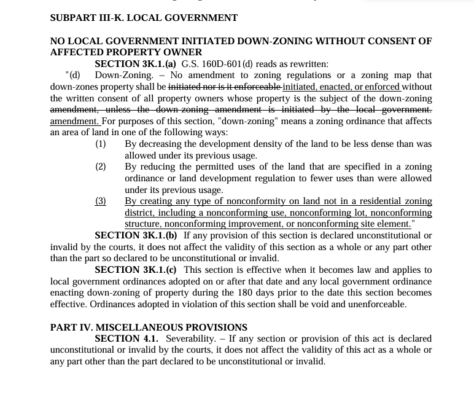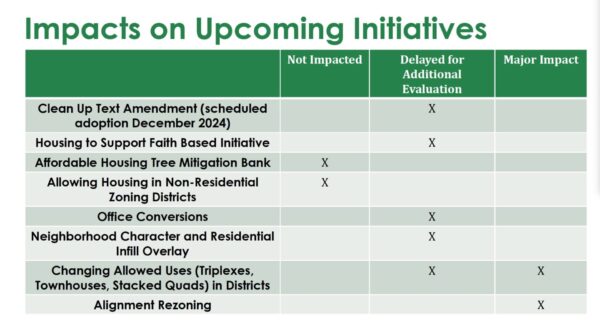What does new state law mean for the UDO?
In the last few weeks of 2024, the State Legislature overrode Governor Cooper’s veto of SB382. The Senate bill contains $227 million in Hurricane Helene relief for those in Western North Carolina; however, this was not the only item in this bill.
The second-to-last page of the 100+ pages of the bill contained this change to zoning for every city and jurisdiction in the state.
This means that all property owners must approve zoning changes that reduce density. This will not be practical when changing zoning districts across Charlotte. The change will also impact the allowed use of a non-residential-zoned piece of land. The city can not reduce the permitted uses in those districts or create additional restrictions.

The items with strike-throughs are removed from existing law, and the items underlined are new.
On Monday, the Charlotte Planning Department briefed the Transportation, Planning, and Development Committee on the potential impacts this state law will have on future changes to the Unified Development Ordinance (UDO). Staff stated they would need more time to determine the extent of the modifications needed for more than half of the upcoming initiatives. They will also have to evaluate all text amendments passed since June 11, 2024, given that the law is retroactive by 180 days.

Our take
In our previous UDO update, we highlighted the importance of expanding housing diversity and affordability within Charlotte across various neighborhoods, while also striving to reduce the required parking space for developments. However, these initiatives may need to be deferred until adjustments are made to SL382 or until we receive further guidance on how jurisdictions can effectively proceed.
Changes to these new rules in SL 382 will be crucial at the state level for enabling Charlotte to meet these important objectives. At this time, the state legislature has effectively put a hold on portions of the zoning code, which is very concerning. We remain optimistic that revisions to this section of state law will be implemented in a timely manner.
We will share updates as they are available.
Thanks for reading!
As a nonprofit, community support is essential for us to keep doing what we do — including providing free articles like this. If you found this article helpful, please consider supporting Sustain Charlotte.
Want to stay in the loop? Subscribe to our weekly newsletter and follow us on Instagram, Facebook, and X.
